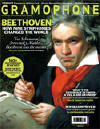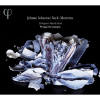Texte paru dans: / Appeared in:
*

GRAMOPHONE (10/2011)
Pour s'abonner /
Subscription information
PHI
LPH002

Code-barres / Barcode :
5400439000025 (ID154)
Reviewer: Jonathan
Freeman-Attwood
Staple Bach offered with a seasoned instinct but admittedly mixed results
With Collegium Vocale Gent appearing on a new label for the first time since moving from Virgin Classics to Harmonia Mundi in the late 1990s, what could better herald a fresh beginning for a seasoned vocal ensemble than Bach’s motets? Herreweghe’s last account dates from more than 25 years ago, when it was received as a template of refinement. But a generation is a long time in early music performance and this blend of new and experienced singers is transformational in its confident projection and distilled emotional responses.
How one paces the six motets over the hour is where Herreweghe earns his spurs; the order and balancing of the connected rhetorical worlds alongside the textural and the figural specificity of each work stacks up with an impressive and mature authority. If the opening double-chorus “concerto” that is the perennially fresh Singet dem Herrn falls short on both bloom and visceral energy, Jesu, meine Freude is redolent of the most involving and imbued Schutzian landscape for which Herreweghe is justly fêted. The web of five alternating voices creates an affecting narrative of disarming concentration. How memorably “the jaws of the death” are assuaged towards “serene certainty” through meticulous tempo and dynamic inflections.
The recorded sound allows for less air than some of the more generous and glamorous acoustics of Harmonia Mundi but the varied colla parte accompaniments are persuasively embedded, especially in the final two pieces (BWV226 and 228), where wind plays a significant part in restoring the recognisable homogeneity of Collegium Vocale’s most successful Bach excursions over the years.
Herreweghe makes clear that “a groundbreaking reading is not necessary” and that, rather, he is embarked here on a “progress report”. For expressive eloquence, top marks, but he is hampered at times by the sense of a “guest” ensemble short on the familiar bearings of a regular vocal outfit — even if this is relative. Inconsistent intonation, especially from the sopranos, leads to an unsettled Komm, Jesu, komm, and Lobet den Herrn doesn’t really deliver what it promises.
Furchte dich nicht is, though, an ecstatic reading by any standards, Herreweghe drawing on the dark and softly articulated canvas of brass which sets up an insistent and illuminated cantus firmus on “Herr, meim Hirt”. Vintage Herreweghe in parts, if not in toto.
Cliquez l'un ou l'autre
bouton pour découvrir bien d'autres critiques de CD
Click either button for many other reviews


